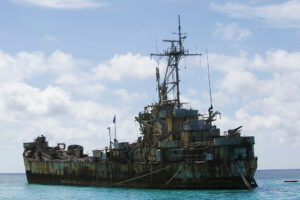Manila to continue China trade ties amid tensions — US research group
MANILA is unlikely to cut trade and business ties with China amid tensions in the South China Sea, but they could make it more difficult for Chinese investors to expand their businesses in the country, according to a Virginia-based research group.

By John Victor D. Ordoñez, Reporter
MANILA is unlikely to cut trade and business ties with China amid tensions in the South China Sea, but they could make it more difficult for Chinese investors to expand their businesses in the country, according to a Virginia-based research group.
“At a minimum, [tensions] complicate things and kind of slows down the process for Chinese investors,” Samantha Custer, director of policy analysis at Virginia-based AidData, told a news briefing at the United States Embassy in Manila on Wednesday.
“I don’t think that the administration — I don’t get the sense at present — is going to totally cut off ties with China,” she added.
Despite potential “economic arm-twisting” by China amid the sea tensions, the government of President Ferdinand R. Marcos, Jr. is likely to continue seeking trade and economic ties with other countries without cutting off ties with Beijing.
“What we’ve observed is that the Marcos administration seems to be quite interested and willing to cultivate new deals with Australia, with Japan, and the US, presumably as a hedging strategy,” Ms. Custer said.
Tensions between the Philippines and China have worsened in the past year as Beijing continues to block resupply missions at Second Thomas Shoal, where Manila has a handful of soldiers stationed at a World War II-era ship that it grounded in 1999 to bolster its sea claim.
Manila, Washington, Ottawa, and Canberra held their first joint military exercises in the South China Sea on Aug. 7 and 8 amid Beijing’s increased military buildup in the waterway.
A Philippine task force handling sea disputes with Beijing has accused a Chinese vessel of deliberately ramming the Philippines’ largest coast guard vessel named BRP Teresa Magbanua thrice near Sabina Shoal.
The Chinese side made a similar claim, with Coast Guard spokesperson Liu Dejun saying the smaller PCG vessel had deliberately collided with their ship.
“AidData is correct that trade and economic relations with Beijing should not suffer as a result of continuing tensions in the West Philippine Sea,” Terry L. Ridon, a public investment analyst and convenor of think tank InfraWatch PH, said in a Facebook Messenger chat, referring to areas of the South China Sea within the country’s exclusive economic zone.
“Beijing and Manila rely on each other for the exchange of various goods and access to each other’s markets should continue despite territorial concerns,” he added.
Bryan Burgess, senior policy specialist at AidData, said China could impose sanctions and limit Philippine access to Chinese markets if tensions worsen, citing Beijing’s ban on Norwegian salmon as an example of “economic arm-twisting.”
“We haven’t seen as many instances of that in the Philippines, but there is significant potential there,” he told the same briefing.
Ms. Custer said it is not in the Philippines’ interest to de-link trade ties with China, adding that Manila should boost negotiations with Beijing and its other partners.
Beijing bankrolled about 233 projects in the Philippines between 2000 and 2022 worth $9.1 billion, according to a 2024 study by AidData.
The Marcos government has withdrawn loan negotiations with China for the P142-billion South Long-Haul project in the Bicol Region, the P50-billion Subic-Clark Railway project and the first phase of the Mindanao Railway project worth P36 billion.
The National Economic Development Authority earlier said it would bank on the Asian Development Bank’s technical know-how to bankroll the South Long-Haul project after Chinese loans failed to materialize.
In March, Chinese Ambassador to the Philippines Huang Xilian told a business forum in Manila that nations that “talk down on China” would miss out on its ambitious economic expansion target of about 5% this year.
China has been the Philippines’ biggest trading partner for eight straight years, and one of its biggest sources of foreign investment, he said.
Mr. Marcos in May said countries should consider tensions in the South China Sea as a major issue for their economies, citing the waterway’s importance to global trade.
In his third address to Congress in July, he said the Philippines would continue to find ways to de-escalate tensions in the waterway without compromising its position or principles. “The Philippines cannot yield. The Philippines cannot waiver,” he said.
More than $3 trillion worth of trade passes yearly through the sea, which China claims almost in its entirety. A United Nations-backed tribunal in 2016 voided its claim for being illegal.
“I think your negotiation hand is stronger when you can have more people around the table,” Ms. Custer said. “The smart play is probably the hedging one, especially for the Philippines.”























